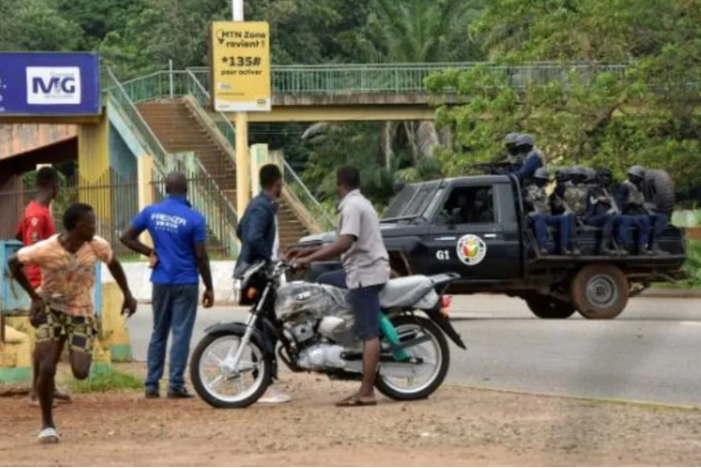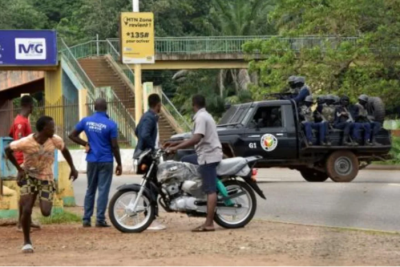Officers from Guinea's special forces announced on Sunday the arrest of President Alpha Conde and the takeover of the capital, Conakry, as well as the "dissolution" of state institutions in a coup that signals the potential end for one of Africa's veteran politicians, who has increasingly become isolated. The special forces officers also imposed a nationwide curfew "until further notice" and replaced regional governors with military personnel.
In a statement broadcast on national television, the officers announced a meeting for the ministers of Conde's government and other senior officials at 11:00 AM GMT on Monday in Conakry. The group warned that "any refusal to attend will be considered rebellion" against the council established by the coup leaders to govern the country.
The officers indicated that "the curfew begins at 8:00 PM nationwide until further notice," but they called on employees to report to work on Monday. They urged "all units (military) in the interior to remain calm and avoid movements toward Conakry." The officers reassured the national and international community that the physical and moral safety of the former president is not at risk, stating that they have taken all measures to ensure he receives healthcare.
No casualties were reported on Sunday during the coup operation, despite heavy gunfire from automatic weapons heard in the capital of this nation known for violent political confrontations. The end of more than a decade of Conde’s rule appeared to trigger scenes of joy in various neighborhoods of the capital.
UN Secretary-General Antonio Guterres strongly condemned in a tweet on Sunday "any seizure of power by force" in Guinea, calling for the "immediate release of President Alpha Conde" and stating he is closely monitoring the situation in the country.
Special forces commander Lieutenant Colonel Mamadi Doumbouya, alongside the coup leaders dressed in military uniforms and armed, stated in a video directed at a reporter from AFP, "We decided, after arresting the president who is now in our custody, to dissolve the current constitution and dissolve the institutions, and we also decided to dissolve the government and close the land and air borders."
After denouncing "mismanagement," he promised to initiate "national consultations to start an inclusive and peaceful transition," in a message broadcast on national television that interrupted regular programming. The coup leaders released a video showing Conde in custody, where he, seated on a couch wearing jeans and a shirt, refused to respond when asked if he had suffered any abuse.
Lieutenant Colonel Doumbouya, previously little known, told France 24, "We control all of Conakry and we are with all defense and security forces to finally put an end to Guinean evil." Paris condemned on Sunday evening the "attempt to seize power by force" in Guinea, calling for the "immediate and unconditional release of President (Alpha) Conde," according to a statement from the French Foreign Ministry. The statement further indicated that Paris "joins the call of the Economic Community of West African States to condemn the attempt to seize power by force" on Sunday and "to demand a return to constitutional order."
The defense ministry stated that the presidential guard "repelled the rebels" when they attempted to storm the presidential palace. However, the authorities that were in place have remained silent since then. Hundreds of residents in Conakry, particularly in suburbs known to support the opposition, took to the streets to welcome the special forces military, according to AFP reporters.
One resident, who declined to be named, stated, "We are proud of our special forces, shame on the police and shame on the militia of former President Alpha Conde, death to the executioners and murderers of our youth." Another resident, Madou Sou, a driver, expressed, "I never imagined that Alpha Conde would leave power in my lifetime; he has wronged me greatly," adding, "He killed during protests my sister Marianna, my brother's son Bissiriou, and my cousin Iladio, none of whom received any sympathy from the authorities."
He was referring to the bloody crackdown on opposition protests and mobilizations against a new constitution adopted in a 2020 referendum, which Conde used to run for and win a third term. The coup leader reaffirmed, "We will rewrite a new constitution together, this time, all of Guinea," expressing regret "for the many deaths in vain, many injuries, and many tears."
The leaders of the main opposition did not wish to speak when contacted by AFP. However, the National Front for the Defense of the Constitution, a coalition of political movements and civil society organizations that organized protests against Conde's third term, stated that they have taken note of the "arrest of the dictator" and the military's statements regarding the constitution.
Hefty gunfire was heard on Sunday morning from automatic weapons in Guinea’s capital Conakry, particularly in the Kaloum area, which is home to the presidency and various institutions and businesses in this West African nation that has been experiencing a political and economic crisis for months. One resident from the nearby Tombouctou neighborhood told AFP, "I saw a convoy of military vehicles with excited soldiers firing in the air and chanting military slogans."
For months, this West African nation, among the poorest in the world despite its vast mineral and water resources, has been suffering from a deep political and economic crisis aggravated by COVID-19. Conde's candidacy for a third term in 2020 led to months of tension resulting in dozens of deaths, along with the arrest of dozens of opposition members before and after the elections.
Conde (83 years old) began his third term in December 2020 despite objections from his main rival, Cellou Dalein Diallo, and three other candidates who decried "ballot stuffing" and various abuses. Conde, a historically significant opposition figure, became the first president to be democratically elected in Guinea in 2010 after decades of authoritarian rule. Human rights defenders have criticized the authoritarianism observed during his presidency over the years, which has led to doubts about the achievements made at the start of his term. Conde boasted of advancing human rights and uplifting the country.




